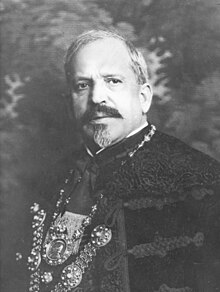Donát Bánki
From Wikipedia, the free encyclopedia
From Wikipedia, the free encyclopedia
Donát Bánki (born as Donát Lőwinger, 6 June 1859 – 1 August 1922)[1] was a Hungarian mechanical engineer and inventor of Jewish heritage. In 1893 he invented the carburetor for the stationary engine,[2] together with János Csonka (known as the Bánki-Csonka engine).[1] The invention is often, incorrectly credited to the German Wilhelm Maybach, who submitted his patent half a year after Bánki and Csonka. Bánki also greatly contributed to the design of compressors for combustion engines.[3]
Donát Bánki | |
|---|---|
 | |
| Born | Donát Lőwinger 6 June 1859 |
| Died | 1 August 1922 (aged 63) |
| Education | Budapest University of Technology and Economics |
| Occupation(s) | inventor, mechanical engineer |
In 1898, Donát Bánki invented the high-compression engine with a dual carburetor, an evaporation method used ever since.
The invention of the carburetor helped the development of automobiles, as previously no method was known to correctly mix the fuel and air for engines.
Some sources say that the idea of the carburetor came from a flower girl. One evening, Bánki saw her while walking home from the Budapest Technical University. She was sprinkling water onto her flowers by blowing spray from her mouth.
Bánki is also given partial credit for the invention of the crossflow turbine.[4]
Seamless Wikipedia browsing. On steroids.
Every time you click a link to Wikipedia, Wiktionary or Wikiquote in your browser's search results, it will show the modern Wikiwand interface.
Wikiwand extension is a five stars, simple, with minimum permission required to keep your browsing private, safe and transparent.